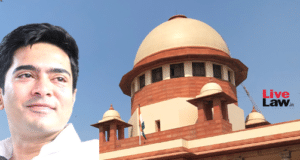Abraham Thomas, September 9, 2024In a decisive move, the Supreme Court of India has upheld the Enforcement Directorate’s (ED) summons for Abhishek Banerjee, a prominent Member of Parliament from the Trinamool Congress (TMC), and his wife Rujira, in connection with a major illegal coal mining investigation. The court’s ruling emphasizes the gravity of the charges and the ED’s jurisdictional authority, marking a pivotal moment in this high-stakes legal battle.
Court’s Ruling on ED Summons
The Supreme Court bench, comprising Justices Bela M. Trivedi and S.C. Sharma, delivered a landmark decision on September 9, 2024, rejecting Banerjee’s plea challenging the ED’s summons. The court concurred with the ED’s assertion that there is a substantial link between the alleged offenses and the national capital, Delhi. This ruling confirms that the ED’s summons to appear in Delhi are justified, given the extensive evidence establishing the nexus between the crime and the offenders in the city.
Case Background and Allegations
The case involves serious allegations against Banerjee and his associates related to illegal coal mining operations. The ED has accused inspector Ashok Kumar Mishra of receiving ₹168 crore from co-accused Anup Majee, which was allegedly intended for delivery to influential political figures in Delhi. The court’s ruling underscores the critical nature of these allegations and the importance of the ED’s jurisdiction in addressing them.
Legal Arguments and Counterarguments
- Banerjee’s Defense: Senior advocates Kapil Sibal and Abhishek Manu Singhvi, representing Banerjee and his wife, argued that the summons issued under the Prevention of Money Laundering Act (PMLA) should adhere to procedures outlined in the Code of Criminal Procedure (CrPC) . They highlighted that PMLA Section 50 lacks specific procedural guidelines and emphasized exceptions for women under CrPC Section 160, given Rujira Banerjee’s childcare responsibilities.
- ED’s Response: The ED countered that the PMLA does not exempt women from appearing for questioning under certain circumstances. They also argued that logistical constraints make it impractical to conduct questioning at Rujira Banerjee’s residence due to the extensive documentation involved.
Implications of the Ruling
The Supreme Court’s ruling sets a significant legal precedent, reinforcing the ED’s authority to summon individuals based on geographic and substantive links to the case. The decision highlights the judiciary’s stance on procedural adherence and jurisdictional authority in high-profile investigations.

Political and Public Impact
The court’s decision is poised to generate considerable political discourse, given Abhishek Banerjee’s influential role in the TMC and the high-profile nature of the case. The ruling may impact future legal proceedings involving similar allegations of financial misconduct and corruption.
The Supreme Court of India has dismissed a plea from Abhishek Banerjee, a prominent Member of Parliament from the Trinamool Congress (TMC), and his wife Rujira, challenging the Enforcement Directorate’s (ED) summons related to an ongoing illegal coal mining case. This ruling marks a significant development in a high-profile investigation that has garnered considerable attention.
Supreme Court Ruling
On September 9, 2024, the Supreme Court bench, comprising Justices Bela M. Trivedi and S.C. Sharma, ruled in favor of the ED’s authority to summon Banerjee and his wife to Delhi. The court affirmed that there is a sufficient connection between the alleged offenses and Delhi, making the summons legally valid. The ruling highlights the court’s endorsement of the ED’s jurisdiction and procedural correctness in this high-profile case.
Case Background and Allegations
The case centers around accusations of illegal coal mining operations linked to Banerjee and his associates. The ED alleges that Inspector Ashok Kumar Mishra received ₹168 crore from co-accused Anup Majee to be transferred to political figures in Delhi. This significant sum and its alleged connections to political corruption have fueled the investigation and the subsequent legal actions.
Legal Arguments and Counterarguments
- Banerjee’s Defense: Represented by senior advocates Kapil Sibal and Abhishek Manu Singhvi, Banerjee argued that the summons under the Prevention of Money Laundering Act (PMLA) should adhere to the procedures outlined in the Code of Criminal Procedure (CrPC). They contended that Section 50 of the PMLA, which governs ED’s powers, does not specify procedural details and that CrPC Section 160, which offers certain exemptions for women, should apply. Rujira Banerjee’s childcare responsibilities were highlighted as a factor in requesting that questioning be conducted at their residence in Kolkata.
- ED’s Argument: The ED argued that the PMLA does not provide exemptions for women in situations involving significant volumes of documentation and evidence. The agency emphasized that the practicalities of the investigation necessitated the questioning of Rujira Banerjee in Delhi due to the complexities of the case.
The Supreme Court’s ruling reinforces the ED’s jurisdictional authority and procedural correctness in handling complex cases of financial misconduct. As the legal proceedings continue, the implications of this ruling will be closely monitored by legal experts, political analysts, and the public.






